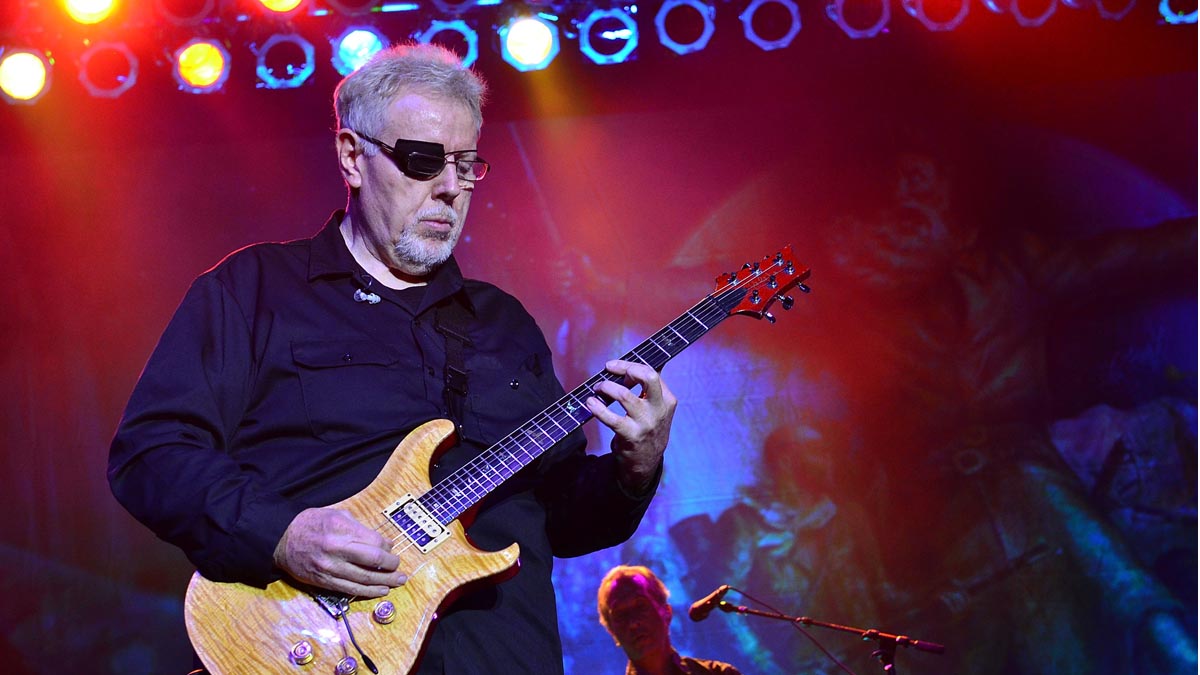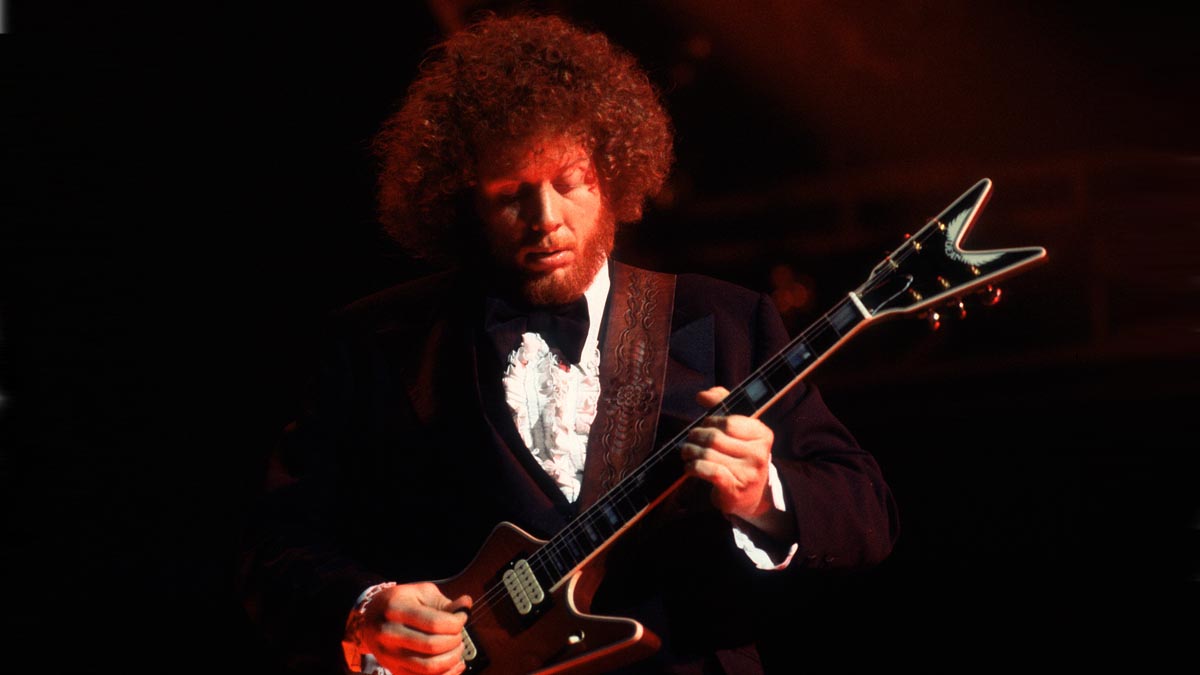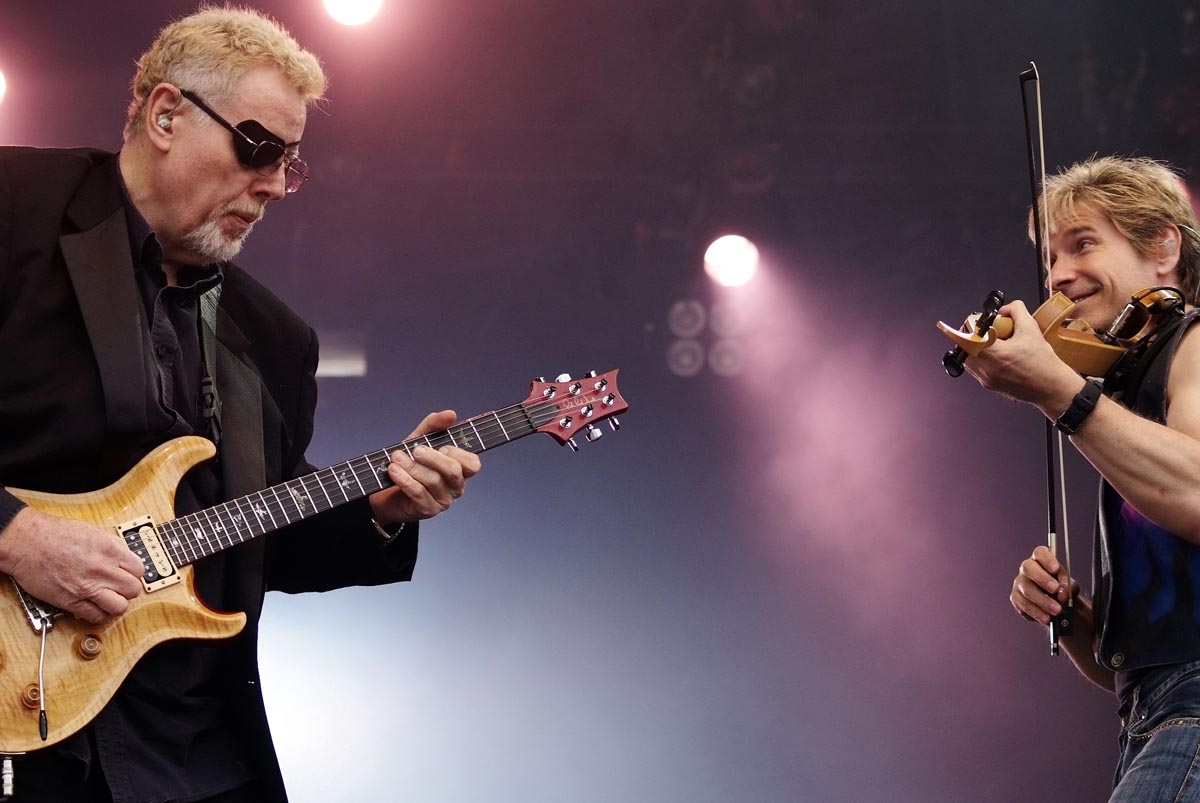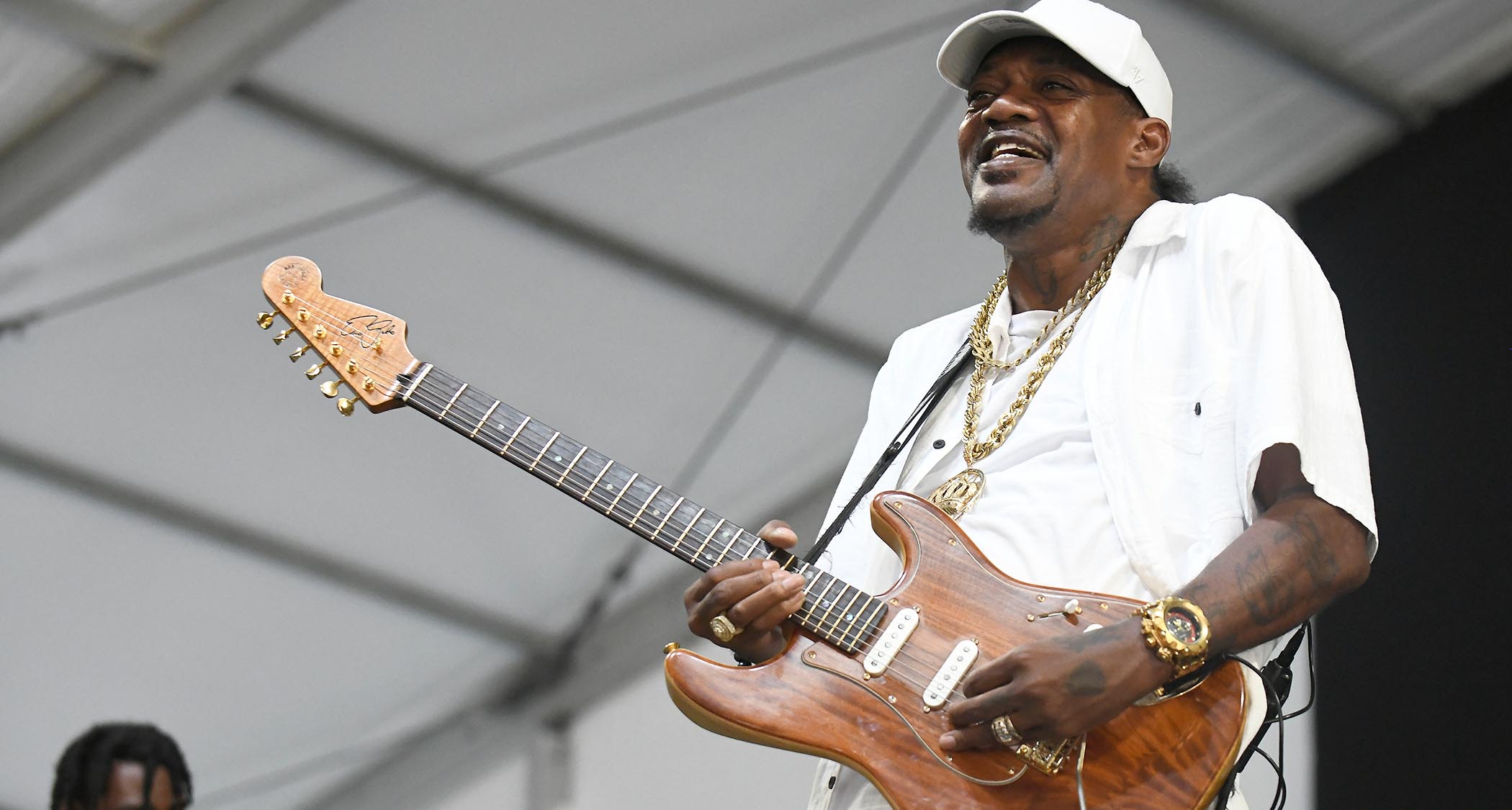
All the latest guitar news, interviews, lessons, reviews, deals and more, direct to your inbox!
You are now subscribed
Your newsletter sign-up was successful
Mention the band Kansas to the average listener, and he or she will instantly name two classic rock staples: Carry On Wayward Son and Dust in the Wind.
“Oh, sure, those are the big ones,” says guitarist Richard Williams, who co-founded the progressive rock outfit back in 1970. “I could let it get to me and go, ‘Hey, we’ve got a whole body of work,’ but that would be a waste of time. Those are the songs that brought us to the table. Without Wayward Son and Dust in the Wind, we wouldn’t be around today.”
Williams recalls how in 1976, with the band deep in debt to their record label and facing an uncertain future after their first three albums (Kansas, Song for America and Masque) stiffed, they approached the recording of their fourth album, Leftoverture, with a sense of impending doom.
“It was a pretty dark time. We were bleeding money pretty seriously,” he says. “We were signed to Kirshner Records, and our benefactor, Don Kirshner, could have easily said, ‘Guys, it’s been fun, but you need to find another record company.’ We needed a hit, and thank goodness we came up with Carry On Wayward Son. It saved us so we could go on. And then we had Dust in the Wind. Those songs exploded and our worlds changed forever.”
Kansas were in a unique position in the mid Seventies. Not only did they represent the last trace of progressive rock on AM playlists that were suddenly ruled by disco, but they were also one of the very few purveyors of American prog, period.
“Not to sound pompous, but we pretty much gave birth to American prog bands,” Williams says. “What’s amazing is, we did it pretty sneakily. We were playing bars in Topeka, doing all the hits of the day – Motown, the British Invasion, all that – but we really wanted to do our own material.
“So we’d slip in one of our own tunes and tell the crowd that we were playing the B-side of Smoke on the Water. We’d stretch songs out and go crazy, and the people loved it. It became our thing.”
All the latest guitar news, interviews, lessons, reviews, deals and more, direct to your inbox!
We were playing bars in Topeka, doing all the hits of the day – Motown, the British Invasion, all that – but we really wanted to do our own material
Of the seven current members of Kansas, only Williams and drummer Phil Ehart remain from the original crew. Singer Steve Walsh, who ended his on-and-off association with the band in 2014, has been replaced by two co-lead vocalists, Billy Greer and Ronnie Platt, who double on bass and keyboards, respectively.
Williams’ longtime guitar foil Kerry Livgren, who also served as Kansas’ chief songwriter, split in 2000, and in his place is New Jersey picker Zak Rizvi.

“It feels like a different band sometimes because we’ve got a bunch of newer faces,” Williams says, “but at the same time, it feels like the original band because we’ve got seven guys who really love to perform and create. Back in the day, we let money and business get in the way. This bunch of guys just wants to make music.”
The band has a new album out, 2020’s The Absence of Presence, and all told, it sounds like quintessential Kansas: there’s muscular, epic prog-rockers like Throwing Mountains and the eight-minute-plus title track, symphonic power ballads such as Jets Overhead and Memories Down the Line, and there’s even a “how-over-the-top-can-we-go?” instrumental in the form of Propulsion 1.
“We’re kind of always in a state of having to prove ourselves,” Williams says. “We had to do it on our last album, [2016’s] The Prelude Implicit, because it was our first new music in 16 years, and I think this time we had to prove that we still mean it.”
He lets out a laugh, then adds, “I imagine on the next one, we’ll have to do the same thing. That’s OK – I’m used to it.”
Before the band got started, who were the guitar players that you were really listening to and emulating?
“I was copying anybody who was there. The Yardbirds were pretty big to me. My introduction to blues wasn’t through the Americans; I dug the British guys. John Mayall and the Bluesbreakers, Eric Clapton – Clapton’s first solo album was like Guitar 101 to me.
“Instead of this twangy rhythmic instrument, suddenly here’s this ballsy guitar with a guttural saxophone lead voice. Suddenly, I was hearing blues in a different way. Of course, I also loved Jimmy Page and Jeff Beck – those guys made a big impression on me. That stuff really formed the basis of my sound and style.“
Growing up in Topeka, was it easy for you to get good guitars living where you were?
“Oh, yeah. I had Marshall amps and Les Pauls. I had a Gibson ES-335, which I still have to this day. Everything that you could buy in Los Angeles you could buy in Topeka. When I was 15, I had a charge account at the local music store. If I wanted something, I’d charge it and make weekly payments on it.
“This was a pretty cool time. When The Beatles were on Ed Sullivan’s show, Topeka exploded, just like every other town in the country. Everybody had to be in a band. There was a garage band on every block.“
Kansas played covers in clubs for a few years. Do you remember when you first heard prog from England and when it started to influence the band?
“It took a while. For a time it seemed as if only the two coasts were hearing the prog stuff. Gradually the stations in Kansas started playing it – I guess somebody’s ears were tuned to it. We’d be like, 'Wow, have you heard this band called ELP?' Or 'Have you heard Genesis’ Selling England by the Pound?'
“It was very exciting to find all these new, creative ways of addressing rock ‘n’ roll. I don’t even know if 'rock ‘n’ roll' was the correct term for that music.“
Some bands were resistant to chance, but we embraced it... We cut our teeth on rock ‘n’ roll. But we were looking to be different
Even so, it didn’t seem as if American bands were jumping on the prog bandwagon. You guys were outliers.
“Some bands were resistant to chance, but we embraced it. I mean, we played Mitch Ryder & the Detroit Wheels-type stuff; we cut our teeth on rock ‘n’ roll. But we were looking to be different. I remember playing cover songs during our club days. You’d get to a part and be like, 'Man, this song sucks. I hate the middle part.'
“So we started thinking that we could do some sort of interlude at the beginning, or maybe we could play the song at half-time. We did anything to change it up and put some balls to the music. In hindsight, we were doing something very important: We were learning how to be us.“

Did it seem as if playing throughout your home state was a dead end? Did the band consider relocating to one of the two coasts to get noticed?
“Well, what happened was, we made a demo tape, and that’s what we sent out to the coasts. One of them wound up on Don Kirshner’s desk. The people at Don’s company loved it – they really dug the violin – and they sent a guy named Wally Gold to check us out.
“We put together a show and did that old free-beer trick: 'Come to the show and the drinks are free.' So Wally showed up and the place was packed; everybody was drunk and partying. So Wally called Don and said, 'Man, there’s something going on here. People are crawling through the windows to get in the place.' That sealed the deal. Next thing you know, we signed a deal with Don Kirshner and were making records.“
Leftoverture [1976] and Point of Know Return [1977] hit one after the other. After being hitless for several years, that must have felt remarkable.
”I’m still here today doing this because of that explosion. We didn’t really know how huge it was at the time. We were just blue-collar guys from the Midwest. I remember arriving at Madison Square Garden in a limo with our manager, and he was going, 'Madison Square Garden! This is so big!'
”We were like, 'Yeah, yeah, whatever.' We’d been on the road for so long, so to us this was just a natural progression of more and more shows. Today I realize how big it was, but back then we didn’t really see it.”
How much of Carry On Wayward Son had Kerry written before the band got to dive into it? And how long did it take to work out that intricate guitar and keyboard solo section?
“That was the last song we did for the album, on the final day or recording. Kerry came in and said he had a new song. We learned the structure of it and got to it. The version you hear on the record is probably the first time we ever played it correctly.
“The solo thing didn’t take long. My approach to guitar is just wing it. I didn’t really have a planned solo. I just responded to what everybody else was doing and threw stuff out there. I was kind of like, 'I’ll just play stuff. Let me know if it sounds right.'“
For rock, it’s always best if it’s not perfect. You need an edge to it. I think that’s one thing about Kansas that’s always been cool – we have that aggression
The acoustic guitar figure of Dust in the Wind is so recognizable. I understand that Kerry wrote it as a fingerpicking exercise.
“Yeah, Kerry didn’t write the song to write a song; he wrote this chord pattern to teach himself fingerstyle guitar. His wife thought it was a song, and he was like, 'No, this isn’t Kansas. The band would never play this.' But he brought it in and we thought it was really nice.
“The figure was there; it didn’t have the middle section or the violin solo. But it came together fast. I remember when we were listening back to it, somebody said, 'That’s the next single.' Kerry didn’t think so, but the rest of us knew. And sure enough – boom. The track exploded on the radio.“
The way you approached the solo section of Wayward Son – is that still the way you compose leads in the studio? I’m thinking of the title track of the new album, which has a similar solo structure.
“It’s sort of the same. What happens is, somebody lays something down and everybody else plays off of it. It’s very collaborative, but not as instant as it was back in the day. Somebody else’s solo will dictate what you’re going to do, and you take inspiration from what they’ve done to go somewhere else.
“It’s always fun to do it that way. I’ll lay down the foundation, and then Zak will play something; Tom will do a smoking keyboard part. Sometimes we redo our parts based on what somebody does.“
The riff in the song Throwing Mountains sounds as tough and mean as early grunge. Did any of that stuff ever make an impression on you?
”Not really at first. I could appreciate the honesty of grunge. It’s like, I loved The Beatles for their polish, but I loved The Rolling Stones for their rawness. You listen to Bob Dylan – his recordings are very elementary, but they’re honest.
”For rock, it’s always best if it’s not perfect. You need an edge to it. I think that’s one thing about Kansas that’s always been cool – we have that aggression. So you mention grunge and that song, sure, I’ll take that. It reminds me of how punk obliterated disco back in the day. Let’s get back to being raw.”
How are you enjoying playing live with Zak Rizvi?
”Oh, I’m loving it. Zak has a deep love and knowledge of the band. He’s a tremendous engineer and guitarist – just brilliant musically. He’s a real scholar of music. Playing with him and having him in the band is great. There isn’t much he can’t play. I mean, he played trombone in a symphony. I have a blast working with him.”
What was it like working with Steve Morse during his time in the band?
”What an interesting guy! When he came in, he had just won every guitar award imaginable; they had to invent awards to give him. I’ll be honest: I was a little intimidated at first, but I was pleased to find out that he’s the least intimidating man around. He’s fascinated by everything.
”We would be on tour, and we would see some crappy band playing at a Holiday Inn or wherever. We would be like, 'Let’s go. This band sucks.' But Steve would say, 'Did you see what that guitar player just did with his on/off switch?' The guitarist wasn’t even that good, but Steve was learning from him anyway.”
For a while you played PRS guitars, but I understand you’ve moved back to Les Pauls now.
”I still play PRS guitars occasionally, but I got my hands on a Les Paul that blew me away. It’s one of the Lee Roy Parnell signature models – a reissue of the ’57 Goldtop – and it’s fabulous.
”It’s got a support in the back of the headstock, so if it falls over it won’t break, and the heel has a cutaway so you can get up the neck a lot easier. I run that through a Fractal Axe-Fx III and I’m good to go. I used to have to spend hours getting tones. Now I can just dial in the sound, and boom – let’s play.”
- Kansas' The Absence of Presence is out now via Century Media.
Joe is a freelance journalist who has, over the past few decades, interviewed hundreds of guitarists for Guitar World, Guitar Player, MusicRadar and Classic Rock. He is also a former editor of Guitar World, contributing writer for Guitar Aficionado and VP of A&R for Island Records. He’s an enthusiastic guitarist, but he’s nowhere near the likes of the people he interviews. Surprisingly, his skills are more suited to the drums. If you need a drummer for your Beatles tribute band, look him up.

